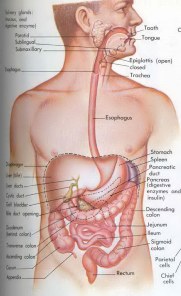For example the connection between gut and brain is a two-way communication system involving the neural, immune and hormonal system. Your gut houses a second brain called the “gut brain” or “Enteric Brain” (Costa, Brookes & Henning, 2000). Interestingly, these two brains are created out of the same tissue. During fetal development, one part becomes your central nervous system while the other turns into your enteric nervous system.
These two systems are connected via the vagus nerve, the longest cranial nerve that runs from your brain stem down to your abdomen. Phenomena such as getting butterflies in your stomach when you’re nervous can be explained through that connection (Blakeslee’s, 1996 New York).
The link between an imbalanced gut flora and abnormal brain development is called GAPS – Gut and Psychology Syndrome (Campbell-McBride, 2010).
Research suggests that when the gut brain is out of balance, weight gain, inflammation, not only our digestive system is affected but also our mind, mood and behaviour.
Anxiety, depression, irritable bowel syndrome, ulcers and Parkinson’s disease manifest symptoms at the brain and the gut level. An impaired gut lining may result in autism, attention deficit hyperactivity disorder (ADHD), attention deficit disorder (ADD) dyslexia, dyspraxia, or obsessive-compulsive disorder (Campbell-McBride, 2010).
Given how the balance of gut bacteria can play a significant role in your psychology and behavior it makes perfect sense to not only nourish your gut flora (e.g. with organic probiotic yogurt, fermented foods) for optimal functioning but also employ relaxation tools or enlist a Holistic Counsellor or Mind-Body Psychotherapist.
Through a holistic approach emotional responses that trigger our digestive system in an unhealthy manner can be targeted and replaced with healthy ones. Another possibility is to look at the psychological and emotional components inflammatory diseases and allergies.
References
Blakeslee, Sandra. “Complex and Hidden Brain in Gut Makes Stomachaches and Butterflies.” New York Times. January 23, 1996.
Dr Natasha Campbell McBride (2010), Gut and Psychology Syndrome, Medinform Publishing, Cambridge.
Costa M, Brookes SJH, Henning GW (2000) Anatomy and
physiology of the enteric nervous system. Gut 47: 15–19.
Mayer EA, Tillisch K, Bradesi S. Review article: modulation of the brain-gut axis as a therapeutic
approach in gastrointestinal disease. Aliment Pharmacol Ther. 2006. 24(6): 919-33.

